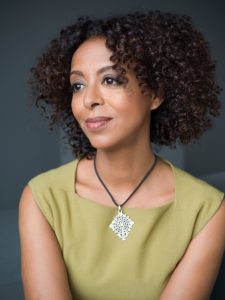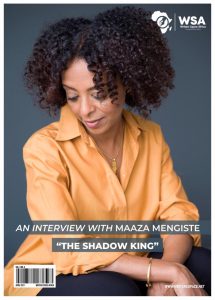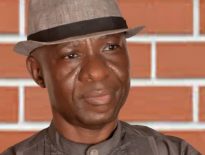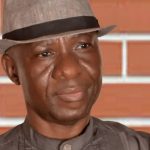By Namwanja Margaret Chikwabi

Maaza Mengiste – Photo by Nina Subin
Maaza Mengiste is an Ethiopian-American author of two critically acclaimed novels, Beneath The Lion’s Gaze (2010) which tells the story of a family struggling to survive the tumultuous years of the Ethiopian Revolution and The Shadow King (2019) which is set during Mussolini’s 1935 attempted invasion of Ethiopia. She also edited an anthology called Addis Ababa Noir (2020). The Shadow King was shortlisted for the 2020 Booker Prize (United Kingdom). I sat down with Maaza to get into her creative mind and learn a thing or two about her experiences as a writer.
Welcome Maaza Mengiste! Thank you for according us, as Writers Space Africa Magazine, this time to converse with you.
Thank you. I’m really happy to be here.
My first question is how did you feel when you were nominated for the Booker Prize for The Shadow King?
I was really excited obviously, but I was really shocked to get the phone call. I had worked for so many years alone on this book that it was hard for me to imagine what would happen when it was published. I was writing and listening to my own instincts, so the idea that people were responding positively and that a group of people that were judges for this big prize responded well was a wonderful shock. It was really an honour, very grateful and you know, it happened in 2020. So, it was nice to get some good news in such a dark year.
Congratulations and yes, it was a difficult year for a lot of people the world over. You’ve said you wrote it over many years, how long did it take you?
From the very beginning until publication, it was nine years, almost ten years. Year by year, you lose track of how many years it’s been. But, looking back, I realise how long that was. When you’re in the middle of it, you’re just trying to get through to the next chapter, to the next scene. So, it took a while, a lot longer than I expected when I started it.
In that time, what was happening? Where you doing your research, putting it aside, then going back to it?
I work full-time. I can’t support myself as I write. So, I was working full-time, then I’d write at night and do research. On weekends, I would be writing. I travelled to Ethiopia and Italy several times using my own funds to carry out research. Sometimes, I had a fellowship that would come in handy. It was always a balancing act between the real world and employment, and the writing and research that this work required.
I think it also speaks to the passion and determination you had about the work- saving up and doing the research when you could, that’s incredible.
I was really inspired by this history and by all the stories of anti-colonial rebellion. Stories from all across the continent helped feed my motivation to write this story.

WSA May 2021 Edition Cover Image
When did you first realise that you wanted to write? Do you remember?
It was not a natural thought to want to write nor was it an assumption when I was growing up that a writer is something I could be. I had no connection with the writing world. I didn’t know any writers. My parents wanted me to be a doctor or an engineer, something reasonable and dependable, something solid. So, this wasn’t part of my understanding of who I could be. I was a literature major in college, but only because I liked to read, not thinking about writing. So, it took many, many years of working and eventually, I started thinking about the possibility of writing a story that was in my head. I didn’t know how to do it, so I applied for summer workshops and graduate programmes and that’s when I started thinking I could become a writer. It was a decade between college and that thought of possibly becoming a writer.
Tell me, what was specific about the story of The Shadow King that made you want to write it? You mentioned earlier that anti-colonial movements in Africa inspired you.
The odds were stacked against those people who were fighting for liberation. They were working against a system that was bigger and stronger than them, and they were working against an entire philosophy. They were fighting that physically as much as they were fighting in military terms. I find it inspiring to think about the fact that we’ve had these liberation movements that have succeeded. In one way or another, they toppled a powerful entity. In Ethiopia, hearing stories about how other African countries had fought and that we had also fought against a colonising force was inspiring. That we ousted them when they were better equipped with bombs, tanks and artillery was even more inspiring. Logically, we should not have won and yet we did. That was really my motivation. As a little kid, it’s something that was always in my mind.
That’s some motivation indeed. What an important piece of literature you have put out, a proudly African story, with well-rounded characters, and one that does not dehumanise us as Africans or minimise the contributions of women.
Thank you very much.
What was the first book that made you laugh or cry or made you think differently about the world?
I think one of the very first books I read as a child that terrified me was the story of Hansel and Gretel. I was living in Kenya then, in the British education system. I was just starting to learn English and was learning to read as well. I remember reading that book and thinking, all these white people eat children! Why are they eating children? I don’t want to be anywhere around them. I was terrified of Europeans after that, for a long time. It was my introduction to reading and also to how your imagination could be captured by a story and change the way you see the world. I really thought that we were all in danger. So, I laugh at it now, but I’ve been moved by books since I was a child, and always felt that they were as real as anything that existed in my world.
That’s amazing. Who are your literary influences now or in the past?
The novel Our Sister Killjoy by Ama Ata Aidoo. It changed my sense of what literature could do and reflects a particular experience. It’s the story of an immigrant, Black African woman who goes to another country but is not understood and doesn’t understand them either. It really resonated with me. Mariama Ba’s So Long A Letter was another influence. These writers were instrumental to me in realising that Africans have a claim to literature also. We are in books and we’ve been writing ourselves for a very long time and it is really good, brilliant work regardless of whether people recognise it or not. What makes this even more inspirational for me is that it is women producing this work.
What is your ultimate dream as a writer and what does success look like to you? Is it the Nobel Prize for Literature or ten million copies sold of your works?
You know it has nothing really to do with prizes. It is the ability to continue to grow as a writer, to challenge myself in the way I write and in the way I can develop a narrative. How can I grow as a thinker and as a creative artist from book to book? In the second book, The Shadow King, I challenged myself to do something I had not done before with structure and voice. I wanted to see if I could really push it and not be afraid to take risks. As for the third book, I’ve set myself that challenge again and I count those as the successes; when I take those leaps.
You’re working on your third novel right now?
It’s very new, so I can’t say very much about it but yes, I am working on it.
That’s an exclusive for us, I do believe. Looking forward to reading it.
Thank you.
You have a schedule for it, as far as publication date?
Not yet.
Alright. That’s exciting and all the best with that.
Thank you.
That actually brings me to this question. How many unpublished works do you have that are just sitting there, waiting to be completed?
I have parts of stories lying somewhere. I do have a story that I need to revise and complete. Working on The Shadow King took all my energy. So, I had ideas written down that I told myself when I’m finished with this book, I’ll come back to. Slowly, I’m beginning to come back to it.
I’ve always wanted to know, what is the one thing you found out or you’re finding out that’s challenging in your writing?
What happens often in writing is that we get frustrated with ourselves and the biggest challenge is to continue, to just keep going, to know that you’re not writing for anyone but yourself. Write what you want to read and that’ll help you in those moments of frustration. It happens to all of us no matter how many books you’ve written or how comfortable you think you are with literature. Those moments will come and the biggest challenge is to sit down and just write, even if it’s one sentence.
Have you ever experienced writer’s block?
I think writer’s block is when you just don’t put anything on paper even though you have it in your head because you feel like it’s not good enough. So, you erase it before you put it down. I have leant to just put something down on paper. Even when I don’t know what I’m going to be saying, I say anything. When I look back at my writing, there’s an idea even in those moments. I have to trust the process. So, I haven’t had writer’s block, but I’ve had bad writing and that’s fine. It’s still writing.
How you’ve explained this is really important for our writing enthusiasts who send in their works to our magazine, Writers Space Africa. It’s good for them to know that no matter what and no matter how you’re feeling, you still have to plod along.
Yes. Absolutely.
Have you ever considered writing under a pseudonym?
Ooh, sometimes. I think it would be so much fun! I’ve thought about it, like could I write a series like the Jason Bourne one. So, who knows! But, that would be an exciting project.
I can imagine it would be fun! Let me take you back to The Shadow King. What surprised you as you were working on it or once you were done and you looked back on it? Was there something you came across in your characters or your research that really surprised you?
When I got done with it and looked back, I was surprised at how the structure I had never done before seemed to come together seamlessly. It took a lot of revisions, a lot of drawings on a board of how each scene would pan out and looking back, I was wonderfully surprised at how each step was necessary to create the final book that it became. I was surprised at that process.
That’s amazing. I’m curious as to how you spend your time when you’re not working or writing. I read somewhere that you’re teaching at a university in New York.
I am. I teach and it takes up a lot of my time when I’m not writing. So, between that and writing and reading, that’s my day literally and lockdown. We’ve been on lockdown for so long. I keep in touch with friends. I like photography, I have a camera and I like to walk outside with it. I read a lot too, both as part of my work and as a hobby.
Take us through the experience of that period from the nominations for the Booker Prize to the final announcement of the winner. What did all that feel like for you, including doing interviews and getting to know your fellow nominees?
My goodness, if you can imagine! Everything was happening on Zoom. At any other time, I would have been going from one office to another for interviews. This time around, everything was happening here at my desk. In some ways, it was a strange experience, to have the world on the other side of my screen. I could see one person, but I knew hundreds were watching and listening. It made me realise how interconnected we are. I thought about all the readers that have come to this book because of technology. It was a wonderful experience to have gone through, all the conversations and interviews I was a part of. But, Zoom can be exhausting. So, there were days when I would want to go outside and not look at my TV screen. But, when we had the Booker Prize ceremony on Zoom, it was surprising how festive it still felt, like something special and having people from everywhere watching was really wonderful.
I’m curious, what are you reading right now?
Let me hold up this book my nephew wrote and he’s seven!
Oh wow! You’re a family of writers!
Oh, yes. It’s all about his travels and where he wants to go. He’s playing football on this page here. The plot is very interesting and often surprising.
Of course! That’s just wonderful, a young author! Look what you’ve inspired!
I tell you! I was talking to him the other day to say thank you for sending me this book and he said, “I’m done. I’m not writing another book!”
At seven, he’s giving up after one book! It really must have taken a lot out of him!
He’s like “I’m finished! I’m done!” He’s so funny. As for me, I like reading several books at the same time. So, I’m also reading Lemm Sissay’s incredibly powerful memoir My Name is Why It’s a beautiful book about a young Ethiopian boy who was adopted in the UK foster system by a white family and when he was twelve, that family didn’t want him anymore and they gave him back. I would recommend it to anyone. I would also recommend another book by Namibian Remy Ngamije called The Eternal Audience of One. A Ghanaian friend of mine Bisi Adjapon has a book coming out called Of Women and Frogs, and I’m reading that one too right now. I would recommend looking at those ones.
Of Women and Frogs. That’s quite an intriguing title.
Oh, yes it is.
We love readers as Writers Space Africa Magazine and so we are glad for those recommendations.
You’re most welcome.
Our WSA Magazine is an international platform that showcases poetry, flash fiction, essays and articles, children’s literature and short stories.
That’s wonderful.
Thank you indeed. Every month, we send out calls for submission and people respond incredibly well.
That’s fantastic.
Thanks. I wonder what advice would you have for writing enthusiasts who do send their works to us? A lot of them are not published yet, but they’re passionate about the their art. Any word to encourage them and for them to improve their art?
The most important part of writing is revising. It takes a while sometimes for a piece of work to be finished. So, when you have that first draft and you love it and you think that you’re done with it, set it aside and come back to it in one week or two. Read it then and have somebody else read it, and then revise it. I would say that part of the writing process is revising. That’s really when the magic happens. That’s really where the writing is. And also, don’t be afraid of the process, just keep going.
That’s really sound advice. I’d like you to talk a little bit about the importance of Africans telling our own stories as you have in your works.
Our stories have been told by other people for so long that it is absolutely important that we tell and share those stories, whether they are told through song, dance, literature or through visual arts. To tell those narratives in your own way is significant because it is a way to rewrite history by writing in the present moment. We can reshape how people have talked about Africa in this way.
Well-put. You know what, I’m done with my questions!
Oh, this has been a wonderful conversation! Thank you.
I’ve really enjoyed it and I’d like to just express our gratitude as Writers Space Africa Magazine for your time and engagement with us. We really appreciate it.
It’s been lovely. Thank you so much and you take care.
Read – Eight Questions for Chief Saka By Namwanja Margaret Chikwabi, Zambia








What a wonderful interview! Great to get book recommendations, too.